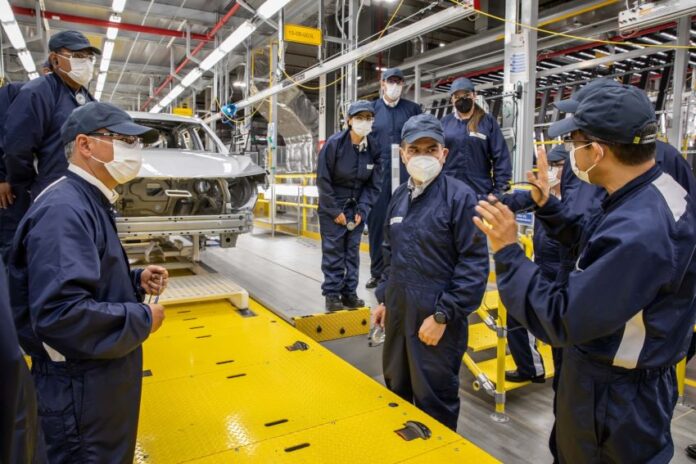Mexico, Canada and the European Union on Tuesday condemned U.S. President Donald Trump’s decision to impose 25% tariffs on global steel and aluminum imports starting next month.
But it is Trump’s recent declaration about Mexico’s automobile exports — made during an interview broadcast on Monday — that could prove to be even more contentious.
#PorSiNoLoViste | Donald Trump advirtió que va poner aranceles a los autos producidos en México. pic.twitter.com/S8vd0D4ioh
— Azucena Uresti (@azucenau) February 11, 2025
“We have a deficit with Mexico of 350 billion dollars. I’m not … gonna let that happen,” Trump told Fox News. “In the meantime, they are building car plants in Mexico in order to sell cars in the United States. … I say no way, you’re not gonna do that. We’re going to put big tariffs on those cars.”
Mexico sends nearly 80% of the cars it produces to the U.S., according to the Council on Foreign Relations (CFR), amounting to some 2.5 million vehicles each year. In addition, the U.S. imports nearly half its auto parts from its northern and southern neighbors.
Trump has said higher tariffs would spur both U.S. and foreign companies to create more auto sector jobs in the U.S. but economists are skeptical, insisting that most costs would simply trickle down to U.S. consumers.
A 25% tariff on cars imported from Mexico would raise production costs for U.S. automakers, CFR writes, adding up to US $3,000 to the price of some of the roughly 16 million cars sold in the United States each year.
Because the US, Canadian & Mexican automotive industries are so highly integrated, many cars sold and assembled in the United States today have high shares of Canadian and Mexican value-added – inputs that would be suddenly subject to high tariffs (taxes).
3/x pic.twitter.com/evpb6ZryDM
— Cato Trade (@CatoTrade) January 30, 2025
According to an analysis by S&P Global Mobility cited by CBS News, the average $25,000 price of a car imported from Mexico could jump $6,250 if the tariffs take effect.
“The tariffs would really hit the automobile industry hard because the motor vehicle industries of the U.S., Mexico and Canada are very intertwined,” Marcus Noland, trade policy expert at the Peterson Institute for International Economics, told CBS MoneyWatch.
“Parts will cross the border seven to eight times before final assembly, and the tariffs are applied every time a part crosses — so costs would go up very quickly.”
Twelve auto manufacturers with factories in Mexico — including Audi, Ford and Volkswagen — would see large-scale disruption from 25% tariffs, and Noland said that they could “tank” the Mexican economy given how dependent it is on automobile exports to the U.S.
“If [automanufacturers in Mexico] start going belly up, you’ll have unemployed people along the U.S. border,” Noland said. “[T]he ironic thing is one of the reasons for [Trump’s] action was illegal migration, and it could actually incentivize illegal migration. By damaging the Mexican economy, you would probably increase the levels of illegal migration.”
With reports from CBS News, Council on Foreign Relations, Reuters and Fox News
